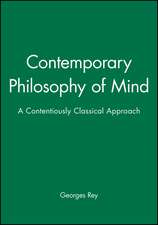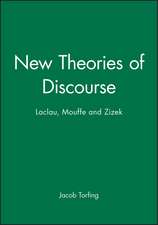Wittgenstein on Rules and Private Language – An Elementary Exposition
Autor SA Kripkeen Limba Engleză Paperback – 4 ian 1984
Preț: 217.49 lei
Nou
Puncte Express: 326
Preț estimativ în valută:
41.62€ • 43.57$ • 34.43£
41.62€ • 43.57$ • 34.43£
Carte disponibilă
Livrare economică 17-31 martie
Livrare express 28 februarie-06 martie pentru 18.55 lei
Preluare comenzi: 021 569.72.76
Specificații
ISBN-13: 9780631135210
ISBN-10: 0631135219
Pagini: 164
Dimensiuni: 152 x 229 x 9 mm
Greutate: 0.2 kg
Ediția:Revised
Editura: Wiley
Locul publicării:Chichester, United Kingdom
ISBN-10: 0631135219
Pagini: 164
Dimensiuni: 152 x 229 x 9 mm
Greutate: 0.2 kg
Ediția:Revised
Editura: Wiley
Locul publicării:Chichester, United Kingdom
Notă biografică
Born in Bay Shore, New York, the son of a rabbi (Myer Samuel) and a writer (Dorothy Karp), Saul Kripke demonstrated his genius to his startled parents when he was only 3 years old. He not only drew the logical consequences of ordinary beliefs, but also solved intricate problems in mathematics. As a child prodigy, he was presented by his father to distinguished mathematicians and philosophers, who were overwhelmed by his talents. His father introduced him at the age of 15 to a group of eminent mathematicians, headed by Haskell B. Curry. From his debut grew his first published article, "A Completeness Theorem in Modal Logic," which appeared in the Journal of Symbolic Logic. Kripke's boyhood genius did not flicker out in the 1960s, when he studied at Harvard, Oxford, Princeton and Rockefeller University or, more accurately, when he worked independently at these institutions and had occasional contact with his surroundings. His academic training was unique. He ascended directly to full professorships, without ever earning a doctorate. In fact, his highest academic degree was a B.A. from Harvard University, which he received in 1962. Kripke never earned a doctorate, because no academician could be found to teach him. Consequently, the universities let him alone and admitted him to their faculties when he said he was ready. Slow to publish his lectures, Kripke nonetheless released a few articles, which he published exclusively in technical journals of philosophy and mathematics. So far his work has extended the boundaries of the most abstruse field of analytic philosophy, modal logic. He is esteemed for having invented the quantitative formulations of modality and for having opened up the ontological territory of possible worlds. At the age of 36, he was appointed James McCosh Professor of Philosophy at Princeton University. Kripke's awards include a Fulbright Fellowship (1962), Guggenheim Fellowship (1968), and a Fellowship from the American Council of Learned Societies (1981). His work, esoteric as it may seem to a public acquainted with such "social" philosophers as John Dewey or Jean-Paul Sartre, has created new fields in mathematical set theory and modal logic, which will generate Ph.D. theses for years to come.

















